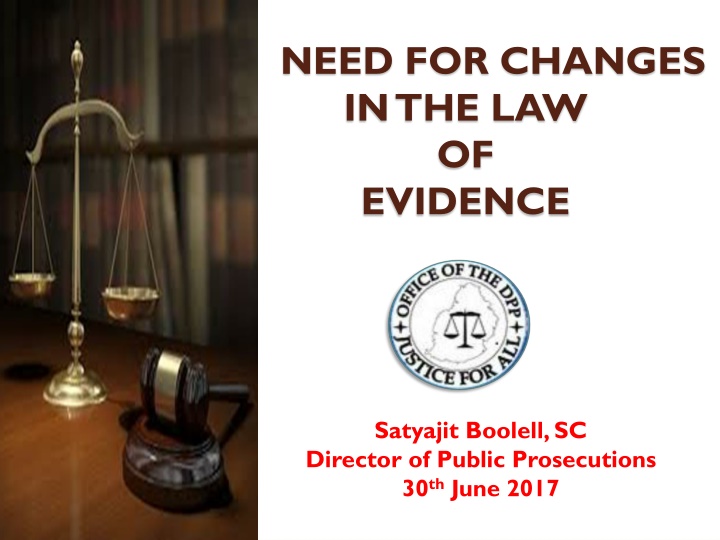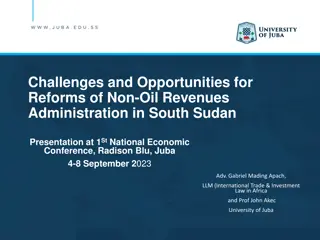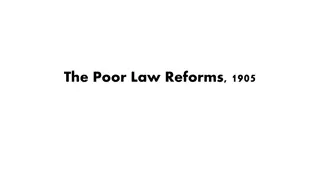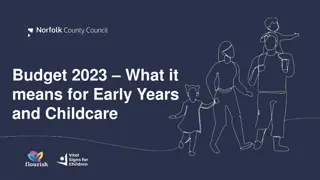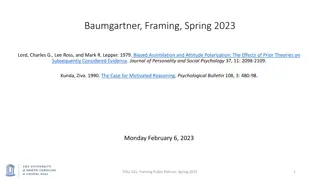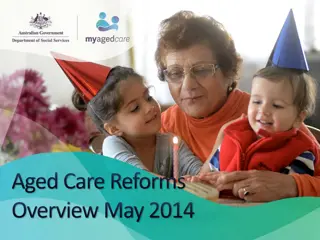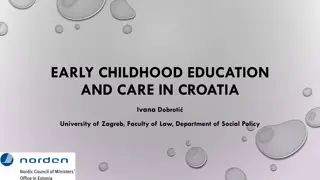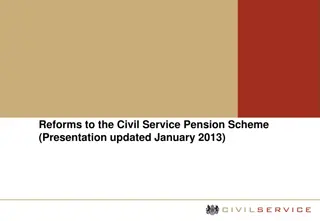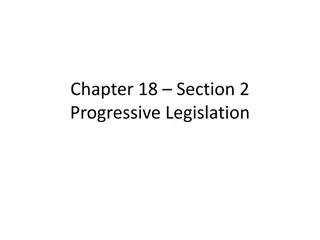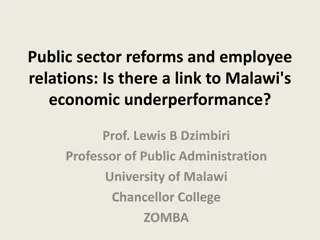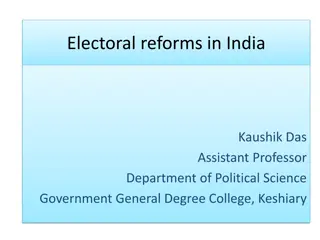Need for Changes in the Law of Evidence: Perspectives and Reforms
Information by which facts are proved forms the essence of the law of evidence, regulating how facts are established in courts. This article discusses the exclusionary ethos, statutory reforms, challenges with hearsay evidence, and examples of reforms from different countries like England, Wales, Australia, and Canada, highlighting the necessity for updates and adaptations in evidence laws to align with modern legal standards.
Download Presentation

Please find below an Image/Link to download the presentation.
The content on the website is provided AS IS for your information and personal use only. It may not be sold, licensed, or shared on other websites without obtaining consent from the author.If you encounter any issues during the download, it is possible that the publisher has removed the file from their server.
You are allowed to download the files provided on this website for personal or commercial use, subject to the condition that they are used lawfully. All files are the property of their respective owners.
The content on the website is provided AS IS for your information and personal use only. It may not be sold, licensed, or shared on other websites without obtaining consent from the author.
E N D
Presentation Transcript
NEED FOR CHANGES IN THE LAW OF EVIDENCE Satyajit Boolell, SC Director of Public Prosecutions 30thJune 2017
THE LAW OF EVIDENCE Information by which facts tend to be proved. Body of law and discretion regulating the means by which facts may be proved in courts.
EXCLUSIONARY ETHOS Common law history Tribunals comprising of jurors or lay justices - fear of being influenced Exclude relevant evidence such as hearsay, evidence of character, opinion evidence of non-experts
STATUTORY REFORMS To bring domestic law into line with the European Court of Human Rights; To rationalize and clarify the law, to enhance the discretionary powers of the Judge; WELCOME NEW CONFIDENCE Trusting judicial and lay fact finders to give relevant evidence the weight it deserves.
HEARSAY EVIDENCE The rule against hearsay is complex and confusing; Need to implement reforms Discretion of the judge to admit hearsay evidence based on relevance and admissibility. Admissible only where the probative value outweighs the prejudicial effect.
Examples of reforms England and Wales A residual discretionary power given to a judge; The Criminal Justice Act: Section 114(1)(d) allows for the admission of hearsay if the court is satisfied that it is in the interest of justice for it to be admissible.
AUSTRALIA Section 65 of the Evidence Act 1995 Admission of evidence as to previous representations (statements) when a witness is not available to give evidence about an asserted fact.
CANADA Requirement of NECESSITY AND RELIABILITY R v Khelawon the reliability requirement is met by showing that there was no real concern about whether the statement was true or not because of the circumstances in which it came about; or that no real concern arose because the truth and accuracy of the statement could nonetheless be sufficiently tested by means other than cross-examination.
IMPACT OF ADMISSIBILITY OF HEARSAY ON FAIRNESS OF TRIAL Section 10 of Mauritian Constitution Fair and public hearing by an independent and impartial tribunal established by law. Al - Khawaja and Tahery v The United Kingdom, Sumodhee & Keramuth v The State of Mauritius [2017] UKPC 16 The primary concern of court is to evaluate the overall fairness of the criminal proceedings; Where hearsay statement is the sole or decisive evidence against a defendant, its admission as evidence will not automatically result in breach of Article 6
DNA EVIDENCE The two tier process Judge s direction: Members of the jury , if you accept the scientific evidence called by the prosecution, this means that there are probably only four or five males in Mauritius from whom the semen could have come . The defendant is one of them. The decision you have reached on all the evidence is whether you are sure that it was defendant who let the stain or whether it is possible it was one of that other small group of men .
Pre-recorded evidence of vulnerable Initial interview between the police and the witness (evidence interview); Audio visual recording of interviews Admissibility Sexual cases- need to reduce trauma of complainants Child witnesses spared from atmosphere of court Section 28 of the UK Youth Justice and Criminal Evidence Act 1999 Admissibility of video recording
EVIDENCE OF CHILDREN With regards to competence of child witness: To do away with the distinction made between child victim and child witness under section 109 of the Criminal ProcedureAct
Comparative Analysis India the law in India creates a presumption of competency in favour of the child, irrespective of his or her age. The child can give evidence under oath if he or she can understand the nature of the oath or affirmation. The child below the age of twelve who does not understand the nature of an oath can still give evidence where the court is satisfied that he or she understands the duty to speak the truth. [s 118 Indian Evidence Act 1872, s 5 (c) Indian Oaths Act 1873]
South Africa The courts here also have indirectly recognised that the sworn or unsworn evidence of a child goes to the reliability of such evidence rather than its admissibility. Interestingly, the court has to be satisfied that the child knows what it means to tell the truth rather than what is meant by truth. DPP, Transvaal v Minister of Justice and Constitutional Development
Canada The Child Witness Project relates to a study carried out by a group of psychologists in Canada. It reveals that the ability of children to give correct answers about the meaning of truth or lie is unrelated to the question of whether they actually speak the truth in reality.
For instance, upon research carried out on a number of children, it was found that 72% of those who said that it was bad to lie did lie about their acts. The study of the authors appears to be helpful in showing that truth-telling behaviour in children is not related to knowing the correct answers to questions about truth and lies, nor is truth- telling behaviour related to knowing that lying is bad.
Therefore, whilst it is important for the administration of justice to ensure that children give a truthful account of events they have witnessed in connection with a case, it is equally important that these children s voices be given due importance without imposing upon them additional burdens which adults themselves do not have whilst testifying
